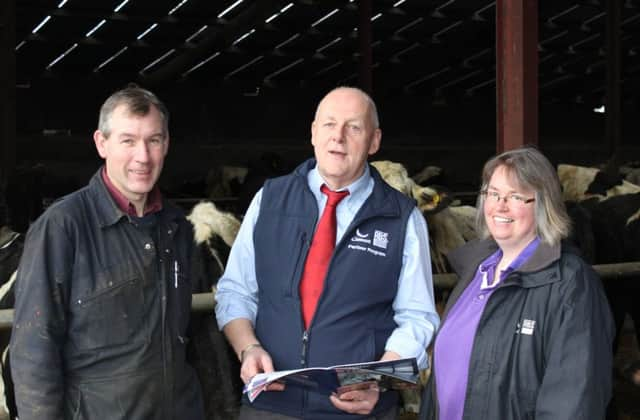RMS: A simple but effective concept


Mark commented: “We joined the Reproductive Management Service (RMS) program just over six years ago, with a primary goal of reducing our calving index.
“At the time we were using a mixture of AI and stock bulls, but heat detection was difficult and we were not getting cows in calf quick enough. As a result herd performance was suffering and we did not have enough fresh calved cows or enough replacement heifers coming through to the parlour.”
Advertisement
Hide AdAdvertisement
Hide AdMark and Pamela knew they could improve technical performance, and to place greater focus on fertility employed the RMS service of Genus on farm. This system includes a daily visit by an RMS trained technician who uses tail chalk on each individual cow allowing for a more informed breeding decision to be made. Fertility and breeding information from every aspect of the herd is inputted to a computer program where it is analysed, providing valuable management information i.e. Dry off lists, PD lists, vet check lists. This data management service allows a farmer to monitor the performance of the dairy herd and also highlights areas of opportunity for further improvement.
Pamela Robinson comments: “The data provided by our RMS technician Cahair McCallister, allows us to be more pro active in management of the herd. We scan now every 14 days so that we can respond to possible challenges quicker and optimise the speed at which our cows bred back. It is a team approach but when you see the positive results it is satisfying to see the hard work and attention to detail pay off.”
While improving fertility performance on farm, genetic gain and development of a uniform herd to suit the farm was also desired. The criteria were specific from the outset- Mark and Pamela wanted a balanced cow, that would be easy managed and suit a grazing system whilst also improving milk yield. To meet these goals the GMS breeding program was used and cows matched to specific sires to maximise genetic gain.
Local breeding adviser for the Robinsons, John Sayers explains: “Over the past six years we have taken the Robinsons herd forward so that they have the type of cow to suit their system with production to match. However there is always room to improve and Mark and Pamela are committed to maintaining the rate of genetic gain already seen in previous years. Going forward additional breeding goals now include increasing fat and protein percentages. To achieve this, all bulls selected for the breeding program deliver significant improvement in component percentages. One such bull is De Su Balisto, a proven sire with +0.11% fat and +0.12% protein with +480kg milk.”
Advertisement
Hide AdAdvertisement
Hide AdMark concludes: “Before we started on RMS we did not have a clear breeding program. We didn’t always achieve the high standards of performance we sought. Today we have a strategy that is paying off. We are setting targets and achieving them which is extremely rewarding. I wish we had started RMS 10 years ago!”
For more information on the RMS system contact your Genus rep or phone the office on 028 3833 4426.
OPEN DAY
On Thursday 26 th January, Genus ABS will be hosting an RMS open day on the farm of Mr Stanley Livingstone, 14 Wilsonstown Road, Armagh, BT60 4QF.
The open day will include information and discussion on what the RMS service and technical support package entails with James Woods from Genus ABS.
Advertisement
Hide AdAdvertisement
Hide AdAidan Fox of Livestock scanning services will explain the importance of scanning in monitoring fertility performance and Gareth Anderson from Farmgate Nutrition will present on the subject of feeding for fertility.